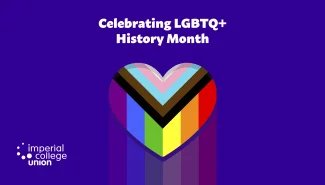![]()
The first UK LGBT+ History Month was in February 2005, coinciding with the 2nd anniversary of the abolition of Section 28, a law which prohibited any local authority from “promoting homosexuality”. This month was introduced in order to educate people about the queer community, a group that historically has been erased and discriminated against, as well as to celebrate the parts of our history that are often overlooked.
LGBT+ History month is important because we must remember what happened in order for us to experience the current place we hold in society today, and to better understand how we can work, how we can shape history, so that LGBT+ can have an even better future.
![]()
How can you honour and celebrate this month?
Whether you are LGBT+ or not, the best ways to celebrate and honour LGBT+ History Month are by demonstrating allyship, celebrating the advancements, and actively engaging in making Imperial more inclusive. The ways in which you can do this are by attending events in the form of talks, documentaries, film screenings, workshops and discussion groups.
This year’s LGBT+ History Month program has been developed in partnership with the LGBT+ Staff Network (Imperial 600) and the students from IQ (Imperial’s LGBT+ Society), and the LGBT+ Officer. This program celebrates people who identify as LGBT+ and educates peers on topics that are affecting the community today. Join the events here.
![]()
Liberation and Community
We are dedicated to making Imperial inclusive in all the ways possible, so we're working with our Liberation and Community Officers to ensure you feel represented at all levels. If you'd like to talk to us this month (or any other) and/or you have a great idea for an event - contact our LGBTQ+ Officer, Keir Logan.
![]()
Ways to be an LGBTQ+ ally
Understand the origins of Pride
Yes, allies can wear rainbows and dance in the street to Lady Gaga but you also need to understand the legacy of protest and political struggle that made it safe to do so.
Take the time to learn about the 1969 Stonewall uprising and the queer people of colour, like Stormé DeLarverie, Marsha P. Johnson and Sylvia Rivera who played key roles. Then, keep reading, listening and watching.
Get between your queer friends and the hostility they face
Taking the initiative to offer your time and energy – shifts some of the responsibility to educate and explain away from LGBTQ+ people. This is active, meaningful and often hard allyship.
Resist the need for validation
If you get an opportunity to address prejudice, in public or in private, resist the urge to tell your queer friends all about it after. Getting a rundown can feel like a downer in and of itself. Save your friend that one reminder that prejudice persists.
There’s also the idea that your allyship itself is what matters. Seeking validation shifts focus on to the relationship between you and your queer friends.
Be conscious of your language
Allyship is not knowing it all and never making mistakes. That’s impossible. It’s putting in the effort and not expecting trophies.
Effort is important because it does take time, whether it’s a new name, a new pronoun or using gender-neutral language in general, e.g. about someone’s partner, to avoid making assumptions. Language is a huge, ever-evolving network so at times, you might still slip up. When this happens, apologise quickly and move on. These things happen and it’s our intentions and our reactions that matter more than the honest mistake.
Accept that you will still make mistakes
After all this, allyship still rests on the principle that your experience and understanding is secondary to the LGBTQ+ people you support. If you make a mistake, someone will hopefully call you in (it’s the gentler form of being “called out”). This should never involve being belittled or harmed but it might feel terrible. The more active you are, the likelier it might happen. So, it’s actually a good sign in the long run.
Being an ally should be hard work but it should also be rewarding.
There is always something you can do
There are many other things that you can do - expanding your reading and watching list, supporting small queer businesses and even writing to your MP (your MP’s job is literally to represent you, so ask your LGBTQ+ friends and family what questions you should be raising with your MP).
Another way you can be an active ally and carry some of the burden behind the scenes is if you as an ally ask your bank, workplace or GP about inclusivity – when it has no effect on you personally – it might be the thing that makes them take notice and do the updating work.
![]()
Sources and Resources:
- LGBTQI+ Young Adults Support Group
- Outing the Past
- General Resources from LGBT+ History Month website
- (Adapted) Article by host of Pride & Joy podcast, Freddy McConnell
- https://www.wolvesunion.org/lgbt



